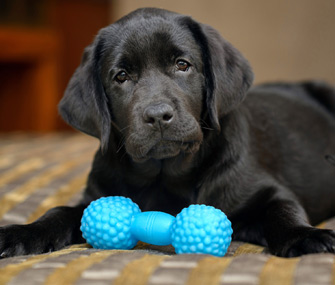Do’s and Don’ts for Picking Puppy Toys
Published on March 03, 2016
Skip To

When selecting a toy, keep your puppy’s changing size and strength in mind. You should also keep in mind that some toys may pose dangers for your pup, so talk to your veterinarian about the safest toys for your dog. When evaluating the safety of a toy, consider the following:
- Toys should not be small enough to be accidentally inhaled or swallowed.
- Toys should not have parts that can be pulled off and inhaled or swallowed.
- Toys should not have any sharp parts and should not form sharp edges when chewed.
- Puppies need to chew, but use rawhide and other chewies with the potential to be ingested only under supervision. If your puppy can chew off a big hunk of it, this can pose a choking hazard, so it’s best to get a larger size or tougher variety.
- Avoid hard items such as butcher shop bones or hooves, which can break teeth.
- Avoid linear objects such as strings, ribbons, pantyhose, socks and rubber bands, all of which can be swallowed.
- If your puppy is obsessed with dissecting squeaky toys to get to the squeaker, only let him have such toys when you can supervise him (and remove the squeaker before your dog can get it).
- Avoid any toys stuffed with beads or beans.
- Many toys that emit animal sounds or move on their own contain batteries, which can be toxic. Never leave a puppy alone with these toys, as he could potentially swallow the battery.
- Never give your puppy a container in which his head could become lodged.
- In general, it’s best not to allow your puppy to play with or chew on sticks, which can break and injure the mouth or other parts of the digestive tract.
- Do not use rocks as fetch toys.
- Avoid rubber toys that have a small hole in only one end. Some dogs have gotten their tongues stuck in the hole.
More on Vetstreet:
- Teach Your Puppy to Play
- Puppy-Proof Your Home
- Can My Dog Have Too Many Toys?
- Why Play Is Important for Puppies
- Making Safe and Effective Pet Toys at Home





